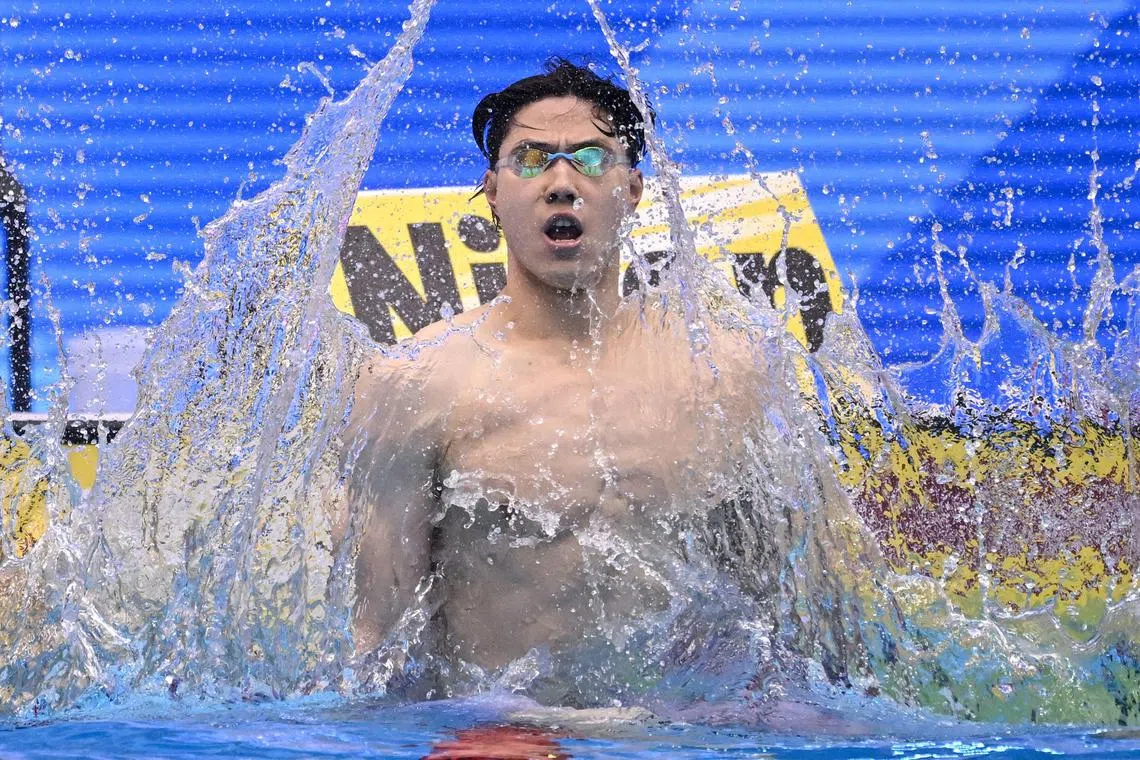China’s breaststroke world champion Qin Haiyang and Co out to make an Asiad splash
Sign up now: Get the biggest sports news in your inbox

China's Qin Haiyang celebrating after winning the men's 200m breaststroke at the World Aquatics Championships in Fukuoka.
PHOTO: AFP
SINGAPORE – Staring at the honour roll at the General Administration of Sport in Beijing, China’s Qin Haiyang imagined seeing his picture alongside some of the country’s swimming greats.
Ahead of the World Aquatics Championships in Fukuoka in July, the breaststroke specialist was still a relative nobody.
The eloquent but soft-spoken 24-year-old told Chinese media: “I was thinking where my picture would be hung. I had to win all three individual events at the world champs. If I cannot even achieve this, there’s no point talking about the Olympics. I never thought I would fail, I was bent on victory.”
And what a picture-perfect meet the Hunan native, whose name aptly means ocean, would go on to have.
First, he rewrote the Asian record in the heats, semi-finals and final as he timed 57.69 seconds to become the first Chinese swimmer to win the 100m breaststroke gold. He then bagged the 50m title two days later.
By the end of the week, Qin had notched more milestones – he set a 200m world record in 2min 5.48sec to become the first swimmer to win all events in the same stroke at a world championships.
China went on to achieve its second-best world championships haul with five golds, three silvers and eight bronzes.
Qin also won a gold in the 4x100m mixed medley relay and a silver in the 4x100m men’s medley relay to cement his spot as the new poster boy of Chinese swimming – replacing the disgraced and suspended Sun Yang.
Not bad for a kid who started swimming at six and dreaded the sport so much then that a coach had to throw him into the pool.
At nine, he moved to a sports school in Shanghai and was handpicked to join the navy’s swim team. Ye Jin, who developed world champions such as Ning Zetao, was his coach then and nicknamed Qin “Mr Cool” as he was a beat slower in most things but had a natural aptitude for training concepts and technique.
But his swimming career was almost derailed by a “stupid mistake” at the Tokyo Olympics in 2021 – when he topped his 200m breaststroke heat but was disqualified for an illegal kick after a turn.
It was back to the drawing board for Qin after that. In August 2022, he moved to Beijing to train with Cui Dengrong, who nurtured Olympic and world champion Zhang Yufei. They focused on improving his core strength and explosiveness.
Former Singapore swimmer Lionel Khoo, who competed with Qin at the 2018 Asian Games, said: “Back then he was more of a 200m breaststroke and individual medley swimmer focusing on middle distance. Since then, he has gotten a lot stronger while being able to maintain his aerobic capacity from his strengths in the 200m.”
Qin said: “Tokyo was a big setback, but there’s no choice. I can only accept the outcome. It’s like a dance – there are movements that have to be on point. It is not easy, and it took a lot of effort.
“But I think the biggest change is in my attitude – from treating swimming as a job to enjoyment.”
Qin now has his sights firmly set on the Hangzhou Asian Games and 2024 Paris Olympics, saying: “I hope I can pull off my best performance out there at the Hangzhou Asian Games. I have lost too many times, I don’t want to lose any more.
“The Tokyo Games remain in my heart and it would be the biggest regret of my career if I cannot prove myself at the Olympics again... I believe if all goes well, the 50m and 100m breaststroke world records will also be mine.”
Qin’s emergence bodes well for China’s bid to reclaim superiority in home waters after being edged off the top of the swimming medal table in 2018 by Japan, who won 19 gold, 20 silver and 13 bronze medals to China’s 19-17-14 haul.
But Japan have gone off the boil since and failed to win any title at the last two world meets, and long-serving national coach Norimasa Hirai has stepped down after more than a decade in charge.
Rikako Ikee, who won six golds in 2018 at the age of 18, was diagnosed with leukaemia in 2019 and has since returned to the national fold,
Freestyle specialists Shinri Shioura and Chihiro Igarashi also took to social media to accuse the Japan Swimming Federation of not putting the athletes’ interest first and disregarding requests to participate in overseas meets.
With the Asian powerhouse in trouble, smaller swimming teams are eyeing their podium chances. Hong Kong’s Siobhan Haughey, who won silver in the women’s 100m free in Fukuoka, is gunning for their first Asiad swimming gold.
Meanwhile, South Korea’s Kim Seo-yeong will be aiming for back-to-back women’s 200m individual medley titles and Hwang Sun-woo will be buoyed by his 200m freestyle national record and bronze medal at the world meet.
Singapore finished third in the medal table at the 2018 Asiad through Joseph Schooling’s 50m and 100m butterfly golds, but he will not be in Hangzhou this time.
However, national coach Gary Tan is eyeing gold in the men’s 50m freestyle through Jonathan Tan and Teong Tzen Wei, and men’s 50m butterfly with Mikkel Lee and Teong. Jonathan’s 50m free national record of 21.91sec, which earned him a Paris 2024 spot, is the second-fastest in Asia in 2023 behind Hong Konger Ian Ho’s 21.86sec.
Gary said previously: “We are going there to break personal bests. If medals come along with that, it will be a natural process. The sprints are a 50-50 crapshoot. As long as our swimmers fire on all cylinders, they can challenge for the podium.”


